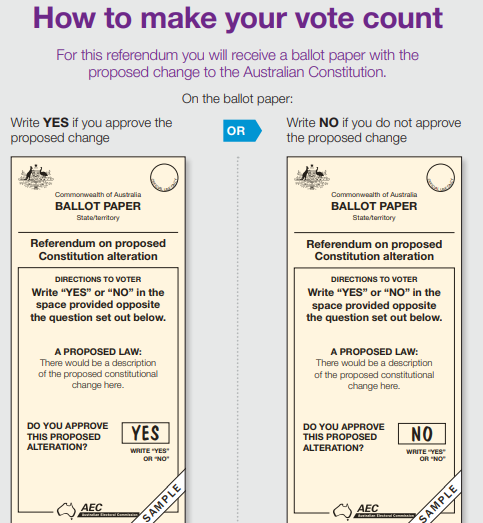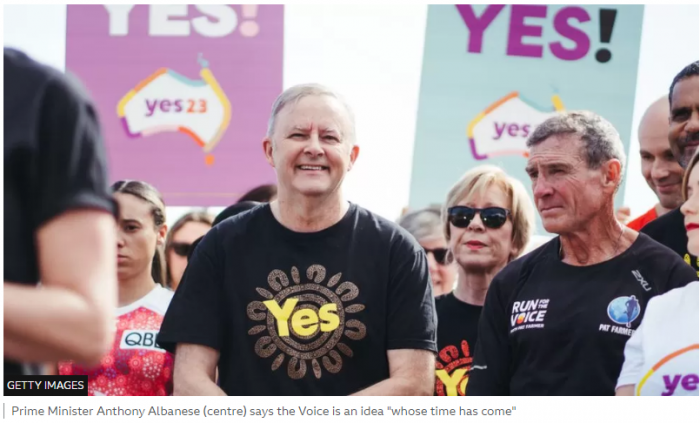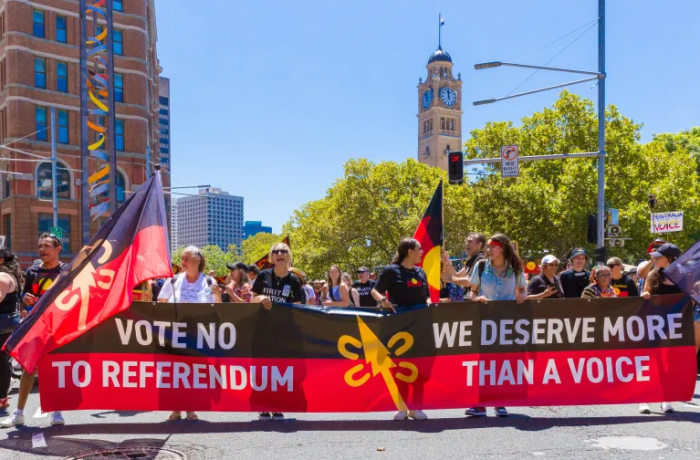Australia - Referendum
This election gives all citizens, regardless of wealth, a fair shot to be heard and participate in every step of the democratic process

The Question - 2023
The question facing voters is whether to amend the constitution to recognize Australias indigenous peoples by introducing voting rights for Aboriginal and Torres Strait Islander people.
The Australian Parliament has agreed to propose the addition of a new chapter, Chapter IX - Recognition of Aboriginal and Torres Strait Islander peoples, to the Constitution. The chapter will contain a new section 129, which will read as follows:
129 Aboriginal and Torres Strait Islander Voice
Recognizing Aboriginal and Torres Strait Islander Peoples as the First Peoples of Australia:
There must be a body called the Aboriginal and Torres Strait Islander Voice;
Aboriginal and Torres Strait Islander Voice may submit proposals to Parliament and the Commonwealth Executive Government on matters relating to Aboriginal and Torres Strait Islander peoples;
Parliament shall have the power, subject to this Constitution, to make laws in relation to matters relating to the Aboriginal and Torres Strait Islander voice, including its composition, functions, powers and procedures.
If you receive a ballot for a referendum, you must write "yes" if you agree with this proposed change to the Constitution, or you must write "no" if you disagree. - Posted on : 09-September-2023

Lies fuel racism in front of Australias Indigenous voice
“People were let off the leash,” says Thomas Mayo quietly, swiping through screenshots.
Racist memes appear on his phone depicting Aboriginal Australians as “gribbers,” “wife beaters,” and “primitives.”
Then personal threats appear, accusing him of “covering up for evil.”
Mayo is one of the public faces of the Yes campaign in Australias historic parliamentary referendum vote on October 14.
If successful, the vote would change the countrys constitution for the first time in 46 years and create a body for Aboriginal and Torres Strait Islander people to advise the government on policy issues affecting their communities.
Opinion polls had long shown support for the change, but now they suggest the no vote is ahead.
Although some claim the shift reflects public sentiment, yes activists blame it on an ecosystem of disinformation - which they say is led by people in the no camp and "amplified" by suspicious reports on social media.
Independent experts say the “most damaging” and widespread falsehoods online relate to race “like wildfire.”
Amid all the noise is growing concern for the mental health of First Nations communities, which is at the center of an increasingly contentious debate.
And questions are being raised again about whether Australia is ready to deal with the open wounds at the heart of its nation. - Posted on : 07-September-2023

what is the voice?
On referendum day, Australian adults will be asked to vote “yes” or “no” on a single question: “A Bill: Amending the Constitution to recognize the indigenous peoples of Australia by introducing an Aboriginal and Torres Strait Islander vote. “Do you approve this proposed change?”
If the answer is yes, the Constitution would be rewritten to allow the Voice to make “representations” to Parliament and the Executive Government “on matters relating to Aboriginal and Torres Strait Islander peoples”.
Advocates say there is no indigenous veto over government policy and lawmakers are free to ignore Voices representations.
But opponents argue that courts could interpret Voices constitutional powers in unpredictable ways, creating legal uncertainty.
Supporters say the vote will include Indigenous Australians from all eight states and territories, the Torres Strait Islands and remote and regional communities.
The members would be elected by the local indigenous population and would hold office for a specific term.
Parliament would have “the power to make laws relating to the composition, functions, powers and procedures” of voting, the constitution says. - Posted on : 31-August-2023
Australian PM vows referendum to recognise Aboriginals
Australian Prime Minister Kevin Rudd on Wednesday used the 50th anniversary of the indigenous land rights movement to pledge a referendum on recognising the countrys Aborigines in the constitution if Labor is re-elected.
His predecessor Julia Gillard shelved a plan to hold a vote this parliamentary term, citing low public support, but Rudd made clear that recognition of Aboriginal people as the countrys first inhabitants was a priority.
"I therefore, as prime minister, want to see this matter brought to the people of Australia by referendum within two years of the election of the next parliament," he said, with national polls scheduled for later this year.
Rudd said he wanted to work with the conservative Tony Abbott-led opposition to draft an appropriate question.
"I want us to agree on the question to be put to the Australian people," he told reporters.
"No more delays, no more excuses, no more buck-passing. Its time the nation got on with this business. That is my commitment to you."
Any change to Australias constitution must be approved by a national referendum in which all citizens vote, and such ballots typically have low levels of success.
Rudd was speaking ahead of an event in the remote Aboriginal community of Yirrkala in the countrys north, where the indigenous land rights movement began 50 years ago with the signing of two bark petitions protesting against a government plan to confiscate a massive block of land to mine for bauxite.
The petitions asserted that the Yolngu people owned the land, and became the first traditional native title documents recognised by the Australian parliament.
While they failed to win their case in the courts, the petitions set in motion the push for the eventual recognition of Aboriginals as full citizens in 1967, and the statutory acknowledgement of land rights in 1976.
"These bark petitions present a bridge between two ancient and noble traditions," said Rudd.
"Eight hundred years ago we had (the) Magna Carta; 800 years later, the Yirrkala bark petitions.
"These bark petitions are Magna Carta for the indigenous peoples of this land. Both (are) an assertion of rights against the crown and both therefore profound symbols of justice for all peoples everywhere."
The 1215 Magna Carta was one of the founding documents of the British legal system, setting out a charter of liberties for the Kings subjects and requiring that he and all future sovereigns abide by a rule of law.
Aborigines are the most disadvantaged Australians, with indigenous children twice as likely to die before their fifth birthday as other children and Aboriginal men estimated to die 11.5 years earlier than other males.
They are believed to have numbered around one million at the time of British settlement in 1788, but there are now just 470,000 out of a total population of 23 million in Australia.
Australian lawmakers formally recognised indigenous peoples as the countrys first inhabitants earlier this year.
The move came five years after Rudd, then serving his first term as prime minister, made an historic apology to Aborigines for wrongs committed since the arrival of British settlers, including the forced removals of children from their parents. - Posted on : 26-July-2013
Frequently Asked Questions


